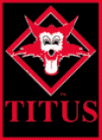Titus Software
 | |
| ISIN | FR0000050122 |
|---|---|
| Industry | Video games |
| Fate | Bankruptcy and Dissolution |
| Predecessor | BlueSky Software |
| Successor | Interplay |
| Founded | 1985 (as Titus France SA) |
| Defunct | 2005 |
| Headquarters | Lagny-sur-Marne, France |
Key people | Eric and Hervé Caen (founder) |
| Products | Video games |
| Revenue | € 73.2 million (2002) |
| Website | www.titus-interactive.com (archived version 2004-06-11) |
Titus Interactive SA,[1] previously Titus France SA,[2] was a French software publisher that produced and published video games for various platforms. Its head office was located in Parc de l'Esplanade in Lagny sur Marne in Greater Paris.[1] At one time, it was instead located in Montfermeil, also in Greater Paris.[2]
Avalon Interactive was a subsidiary of Titus Interactive, responsible for the European distribution of the group's games.
History
Founded by brothers Eric and Hervé Caen in France in 1985,[3] Titus began releasing titles for home computers such as the Amiga, Amstrad CPC, Atari ST, Commodore 64, ZX Spectrum and PC before moving on to consoles like the Sega Master System, Super Nintendo Entertainment System, Game Boy and Game Boy Color, Sony PlayStation, Sega Dreamcast and Nintendo 64, then finally publishing titles for the Nintendo GameCube, Sony PlayStation 2 and Microsoft Xbox.
Titus designed games such as Virtual Kasparov, Automobili Lamborghini, Virtual Chess 64, Roadsters (the Nintendo 64 version), Incredible Crisis (developed by Polygon Magic), Prehistorik Man and Lamborghini American Challenge, that were given positive reviews. Titus however was also involved in the creation of games that were notable due to their overwhelmingly negative reception. Superman for the Nintendo 64 was notorious for its negative status among gamers. GameTrailers called it the worst game of all time.[4] It is currently holding an overall ranking of 23% at GameRankings.[5] Similarly, the 2003 game RoboCop also received overwhelmingly negative reviews. GameSpot gave it 2.2/10 saying "RoboCop has a bevy of horrible problems that render the game practically unplayable."[6]
Acquisitions
- Palace Software (1991)
- BlueSky Software (1998)[7]
- Digital Integration (1998)
- Virgin Interactive - Later renamed Avalon Interactive. (1999)
- Interplay (2001)[8]
Bankruptcy
Titus filed bankruptcy on January 9, 2005 with €33 million ($43.8 million USD) debt.[9] Titus game rights were transferred to Interplay Entertainment.
Games published
Most games were developed in-house by Titus Software unless otherwise stated.
- Crazy Cars
- Fire and Forget
- Galactic Conqueror
- Off Shore Warrior
- Crazy Cars 2
- Titan
- Knight Force
- Crime Does not Pay
- Dark Century
- Dick Tracy
- Fire and Forget II
- Un Indien dans la ville (Little Indian: An Indian in the city for US release), developed by TF1 Video and Titus
- Wild Streets
- Battlestorm
- Crazy Cars 3
- Titus the Fox (AKA Moktar)
- Virtual Chess
- Virtual Chess II
- Metal Rage
- The Brainies
- Incantation
- Oscar (SNES version)
- Rival Realms
- Virtual Chess 64
- Superman (Game Boy)
- Automobili Lamborghini
- Quest for Camelot, published by Nintendo America Inc.
- Roadsters
- Superman
- Evil Zone, developed by YUKE’s Future Media Creators
- Xena: Warrior Princess: The Talisman of Fate, developed by Saffire
- Incredible Crisis, developed by Polygon Magic
- Hercules: The Legendary Journeys, developed by Player 1
- Carmageddon 64, developed by Software Creations
- Blues Brothers 2000, developed by Player 1
- Superman (2000 PlayStation video game) (cancelled), developed by BlueSky Software
- Kao The Kangaroo, developed by X-Ray Interactive
- Top Gun: Combat Zones, developed by Digital Integration
- Virtual Kasparov
- Top Gun: Firestorm
- Worms World Party developed by Team 17
- Exhibition of Speed developed by Player 1
- X'Treme Roller developed by Microïds and Neko Entertainment (It was meant for release in the US, but was cancelled for unknown reasons)
- Sgt. Cruise (cancelled)
- Xena Warrior Princess, developed by Factor 5
Subsidiaries
Titus had several subsidiaries. The United States subsidiary, Titus Software Corporation, had its head office in Chatsworth, Los Angeles. The Japanese subsidiary, Titus Japan K.K., had its head office on the eighth floor of the Kotubuki Dogenzaka Building in Dōgenzaka (JA), Shibuya, Tokyo.[1] The UK subsidiary, Titus Software UK Limited, had its head office in Leamington Spa, Warwickshire.[10]
References
- 1 2 3 "Contact." Titus Interactive. 3 June 2004. Retrieved on 4 September 2012. "Titus Interactive SA : Parc de l'Esplanade 12, rue Enrico Fermi 77462 Lagny sur Marne Cedex. FRANCE"
- 1 2 "Profie." Titus Games. 30 June 1998. Retrieved on 4 September 2012. "310 Avenue Daniel Perdrige, 93370 Montfermeil."
- ↑ IGN Staff (1998). "Eric Caen of Titus Software (interview)". IGN.com. Retrieved June 21, 2010.
- ↑ "Top 10 Best and Worst Video Games of All Time". 2006-11-17. Retrieved June 21, 2010.
- ↑ "Superman Reviews". GameRankings. Retrieved June 21, 2010.
- ↑ "Robocop Review". Gamespot. Retrieved June 21, 2010.
- ↑ www.ign.com/companies/titus
- ↑ LA Times (August 17, 2001). "Titus Takes Control of Irvine's Interplay". Los Angeles Times. Retrieved June 21, 2010.
- ↑ "Titus bankrupt, Interplay's future uncertain". Gamespot. 2005-01-05. Retrieved 2013-05-06.
- ↑ "Contacts." Titus Interactive. 3 February 2002. Retrieved on 4 September 2012.
External links
- Titus Interactive (Archive)
- Titus Games (Archive)